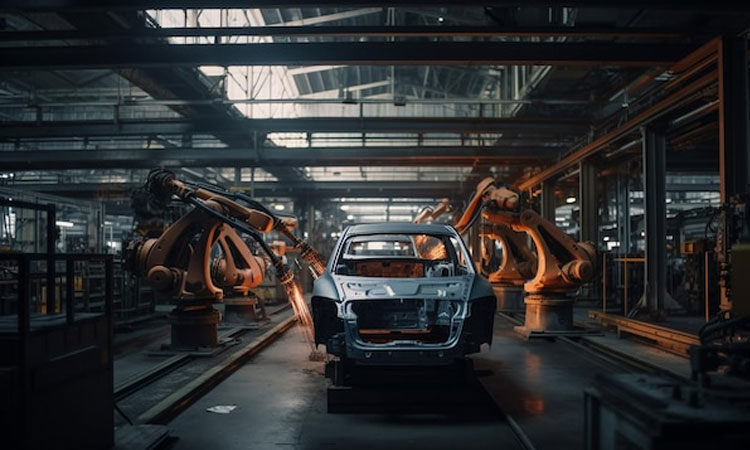In the bustling heart of the automotive industry, where innovation meets tradition, a wave of technological advancements is sweeping across the landscape, reshaping the very fabric of the industry. With the emergence of groundbreaking technologies such as Artificial Intelligence (AI), additive manufacturing, the Internet of Things (IoT), and 5G, the automotive sector finds itself on the cusp of a transformative journey, brimming with new opportunities and endless possibilities.
Artificial Intelligence :
At the forefront of this revolution is the integration of AI into vehicle design, production, and operation. AI-powered algorithms analyze vast datasets to optimize vehicle performance, enhance safety features, and personalize user experiences. From predictive maintenance to autonomous driving systems, AI is driving unprecedented levels of innovation, pushing the boundaries of what’s possible in the automotive realm.
The integration of AI into vehicle design, production, and operation presents several benefits for suppliers of machines or parts:
Increased Demand: As automotive manufacturers adopt AI-powered technologies to optimize vehicle performance and enhance safety features, there is likely to be an increased demand for advanced machinery and components that can support these innovations. Suppliers offering AI-enabled machines or parts that facilitate predictive maintenance, autonomous driving systems, and other AI-driven functionalities are well-positioned to capitalize on this growing market demand.
Technological Advancement: Collaborating with automotive manufacturers to integrate AI into their products can drive technological advancement for suppliers. By developing AI-powered machinery or components, suppliers can enhance the capabilities and efficiency of their offerings, making them more attractive to customers seeking cutting-edge solutions in the automotive industry.
Competitive Advantage: Suppliers that embrace AI technology early on can gain a competitive advantage in the market. By offering AI-enabled machines or parts that deliver superior performance, safety, and user experience, suppliers can differentiate themselves from competitors and position themselves as leaders in the automotive supply chain.
Enhanced Productivity: AI-powered machinery can improve productivity and efficiency in manufacturing processes. By automating tasks, optimizing workflows, and reducing downtime through predictive maintenance, AI-enabled machines can help suppliers streamline their operations and meet the increasing demands of automotive manufacturers more effectively.
Long-Term Partnerships: Collaborating with automotive manufacturers on AI-driven innovations can foster long-term partnerships and relationships between suppliers and their customers. By demonstrating a commitment to innovation and providing value-added solutions, suppliers can establish themselves as trusted partners that contribute to the success and competitiveness of automotive companies in the evolving market landscape.
Additive Manufacturing :
Meanwhile, additive manufacturing, also known as 3D printing, is revolutionizing the way vehicles are built. By layering materials to create intricate components with unparalleled precision, additive manufacturing offers unparalleled flexibility and efficiency in production processes. Complex parts that once required multiple manufacturing steps can now be produced in a single run, reducing lead times and costs while enabling greater design freedom.
Machine Tools industry can derive several benefits from the rise of additive manufacturing in the automotive industry:
Increased Demand: The adoption of additive manufacturing in vehicle production creates a surge in demand for specialized machinery, equipment, and materials required for 3D printing processes. Suppliers offering additive manufacturing machines, 3D printing materials, and related components can capitalize on this growing market demand.
Technological Advancement: Embracing additive manufacturing technology allows suppliers to drive innovation within their offerings. By providing state-of-the-art 3D printing machines and materials, suppliers can enhance their competitiveness in the market and attract customers seeking cutting-edge solutions for vehicle manufacturing.
Cost Efficiency: Additive manufacturing enables the production of complex parts in a single run, reducing the need for multiple manufacturing steps and assembly processes. This streamlined production approach translates to cost savings for automotive manufacturers and creates opportunities for suppliers to offer cost-effective solutions to their customers.
Design Flexibility: Additive manufacturing offers greater design freedom compared to traditional manufacturing methods. Suppliers can leverage this advantage by providing customizable solutions that meet the unique design requirements of automotive manufacturers, fostering long-term partnerships and customer loyalty.
Environmental Sustainability: Additive manufacturing often produces less waste compared to traditional manufacturing methods, making it a more environmentally sustainable option. Suppliers can position themselves as champions of sustainability by offering additive manufacturing solutions that align with the automotive industry’s increasing focus on eco-friendly practices.
IoT :
The Internet of Things (IoT) is another game-changer in the automotive industry, enabling seamless connectivity between vehicles, infrastructure, and users. IoT sensors embedded within vehicles collect real-time data on performance, maintenance needs, and driver behavior, allowing for proactive monitoring and optimization of vehicle operations. From smart navigation systems to remote diagnostics, IoT technologies are enhancing the driving experience while improving safety and efficiency on the road.
5G Future :
The rollout of 5G networks promises to unlock a new era of connectivity and communication within the automotive ecosystem. With blazing-fast speeds and ultra-low latency, 5G enables real-time data exchange between vehicles and their surroundings, laying the foundation for advanced driver assistance systems (ADAS), vehicle-to-everything (V2X) communication, and fully autonomous driving capabilities.
The convergence of AI, additive manufacturing, IoT, and 5G technologies is ushering in a new era of innovation and opportunity in the automotive industry. From enhanced safety features to personalized user experiences, these advancements are driving revolutionary changes in how vehicles are designed, manufactured, and experienced by customers. As the industry continues to embrace and adapt to these transformative technologies, the future of automotive innovation promises to be brighter and more exciting than ever before.
image courtesy : Designed by Freepik



